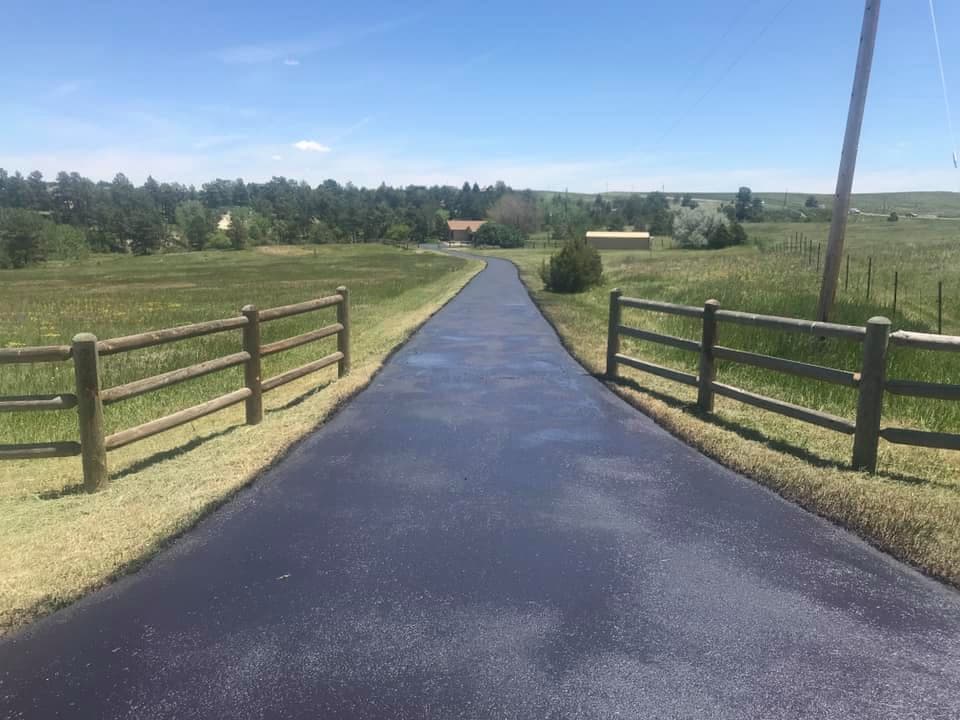Living along the Front Range means experiencing some of the most dramatic weather swings in the country. One October morning, you’re scraping frost off your windshield at 24°F. By afternoon, you’re in short sleeves enjoying a 53°F sunny day. That’s a 29-degree temperature change in less than 24 hours—and your asphalt driveway feels every degree of it.
Add in Denver’s 300 days of annual sunshine (yes, we really do get that much sun), intense UV exposure at a mile high, and winter snowmelt that seeps into every crack, and you’ve got the perfect storm for asphalt deterioration. Sealcoating is one of the smartest ways to protect your driveway from our unique climate, but it’s also one of the most misunderstood maintenance steps. Some homeowners think it’s cosmetic. Others assume it’s unnecessary. The truth? It’s essential—when done right.
The Pros of Professional Driveway Sealcoating
Protects Against Front Range Freeze-Thaw Brutality
Colorado’s weather doesn’t just wear down asphalt—it attacks it. When temperatures swing above and below freezing (sometimes multiple times in a single week), moisture trapped in your driveway expands and contracts, creating a cycle that cracks asphalt from the inside out.
Sealcoating creates a waterproof barrier that keeps snowmelt and rain from penetrating the surface. That means less water seeping in, fewer freeze-thaw failures, and a driveway that can actually survive Denver winters. When applied by an experienced Denver asphalt contractor, a quality sealcoat is your first line of defense against our relentless climate.
Shields Against High-Altitude UV Damage
Here’s something most people don’t realize: Denver’s sunshine isn’t just beautiful—it’s brutal on asphalt. At 5,280 feet, UV radiation is significantly more intense than at sea level. That constant sun exposure oxidizes asphalt binder, causing your driveway to fade from deep black to dull gray and become brittle over time.
A professional sealcoat acts like sunscreen for your driveway, blocking UV rays and slowing oxidation. The result? That rich, black finish stays intact longer, and the asphalt underneath stays flexible instead of turning brittle and cracked.
Restores Curb Appeal Instantly
There’s something about a freshly sealed driveway that transforms a home’s entire appearance. That deep, uniform black finish looks sharp, well-maintained, and intentional. If you’re planning to sell your home—or you just take pride in how it looks—sealcoating delivers an immediate visual upgrade for a fraction of what you’d spend on other exterior improvements.
Prevents Small Surface Wear from Becoming Major Repairs
Sealcoat fills hairline cracks and surface imperfections before they become problems. In the Denver metro, where moisture infiltration is a constant threat, catching damage early can save you thousands. A small crack left untreated this fall can become a pothole by spring—especially after a winter of freezing, thawing, and snowplow abuse.
Extends Your Driveway’s Lifespan by Years
A well-installed asphalt driveway can last 20+ years with proper care. Add regular sealcoating every 2–3 years, and you can easily push that to 25 or 30 years. That’s several more years before you’re facing a $10,000+ replacement bill. It’s not just maintenance—it’s long-term financial protection.
The Cons (and Misconceptions) of Sealcoating
It’s Not a Miracle Cure for Structural Damage
Let’s be clear: sealcoating won’t fix deep cracks, alligatoring, or base failures. If your driveway has serious structural issues—like large potholes or areas where the base has settled—those need to be repaired first. Sealcoat is a protective layer, not a repair compound. Applying it over major damage just hides the problem temporarily, and you’ll be disappointed with the results.
Timing Is Everything—and Colorado’s Weather Is Unpredictable
Sealcoat requires warm, dry conditions to cure properly. Temperatures need to be consistently above 50°F, with no rain in the forecast for at least 24–48 hours. In Denver, that typically means a sealcoating season from May through early October. Wait too long, and an unexpected cold snap or early snow can shut down the season entirely. Planning ahead is key.
You’ll Need to Stay Off Your Driveway for 24–48 Hours
After sealcoating, your driveway needs time to cure before you can drive or park on it. Most homeowners find this to be a minor inconvenience—especially compared to the protection it provides—but it’s worth coordinating with your family’s schedule. Professional contractors will give you clear instructions on when it’s safe to use your driveway again.
DIY vs. Hiring a Professional: What Actually Works in Colorado
It’s tempting to grab a few buckets of sealer from the hardware store and tackle this yourself. On paper, DIY sealcoating seems straightforward. In practice, it rarely works the way homeowners hope—especially in Colorado’s challenging climate.
Most store-bought sealers are heavily diluted. They’re designed for milder climates and lighter wear, not the freeze-thaw punishment and intense UV exposure we deal with on the Front Range. Homeowners who go the DIY route often find their driveway fading again after just one winter. The sealer wears off quickly, coverage is uneven, and you’re left with streaks, drips on the garage floor, and edges that look sloppy.
When you hire a Parker sealcoating company or Colorado Springs asphalt contractor, you’re not just paying for materials—you’re paying for expertise that matters in our climate. Professionals use commercial-grade sealer specifically formulated to withstand Colorado’s weather extremes. They clean and prep the surface properly, fill cracks correctly, and apply multiple coats with professional-grade equipment for consistent, durable coverage.
Perhaps most importantly, experienced contractors know how to read Front Range weather patterns. They understand when conditions are right for application and when it’s better to wait—something that can make or break a sealcoating job. A professional application lasts longer, looks better, and gives you confidence that your driveway is truly protected year-round.
How Often Should You Sealcoat in Denver?
Because of Colorado’s intense climate—those freeze-thaw cycles, that relentless sunshine—most driveways along the Front Range should be sealcoated every 2–3 years.
If your driveway is brand new, wait about 12 months after installation before applying the first sealcoat. This gives the asphalt time to fully cure and off-gas. After that, stay on a regular maintenance schedule to keep your driveway protected through every season.
Final Thoughts
Sealcoating isn’t just about making your driveway look good (though it definitely does that). It’s about protecting one of your home’s most-used surfaces from one of the country’s most demanding climates. When done professionally, sealcoating extends your driveway’s life, prevents costly repairs, and keeps your home looking sharp through Denver’s blazing summers and brutal winters.
If you’re in Elizabeth, Littleton, Colorado Springs, or anywhere in the Denver metro area, Riley’s Asphalt understands what Front Range driveways go through—and how to protect them.

